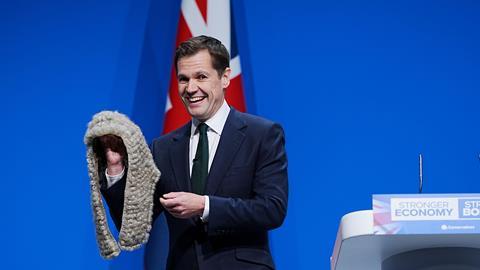Say what you like about the Conservatives and their conference, but they provided plenty of material for legal journalists taking the trip up to Manchester.
No vague promises of a bit more justice spending here or there for them (indeed, no promises of any justice spending at all). Sadly too no mention of legal aid, or the state of the courts, or the criminal court backlog.
But there were plenty of justice-related bones to throw the delegates, most of whom cheered each policy announcement: leaving the ECHR, restoring the pre-2005 role of the lord chancellor and rooting out so-called activist judges whose rulings are not compatible with the sentiments of the general public.
Shadow justice secretary Robert Jenrick, pretty much the only shadow minister who could ensure a full house when he spoke, even made the slightly preposterous gesture of producing a judge’s wig on stage to emphasise how the country would no longer stand for biased members of the bench bringing their own prejudice into court decisions.
He had an enthusiastic ally in shadow justice minister Kieran Mullan, who called in one fringe meeting for a mechanism to oversee whether judges are making the correct decisions (quite who makes that judgement was unclear). Mullan was clear to stress he couldn’t envisage a US-style system of judges hand-picked for their political leanings, but seeking out some halfway house between that and our system rather misses the point.
Because there is no halfway house in terms of judicial independence from Westminster. The autonomy of the judiciary is a fundamental, not a moveable, feast. We cannot chip away at it without undermining it fatally.
Read more
This is not to say judges should be above scrutiny. The Judicial Conduct Investigations Office is still opaque and secretive, with little insight into how investigations are carried out, what questions were asked of judges and what the sanctions against them amount to in reality (what does ‘formal advice’ really mean?).
But that kind of scrutiny is not what Mullan and Jenrick are talking about. They are not particularly interested in judges who bully lawyers, take an age over producing rulings or those who do not follow correct procedure. Their version of scrutiny is to oversee and potentially challenge decisions which they (and they would argue, the public) take issue with. They complain about bias among judges, but only when such bias does not fit with their own political agenda.
There are two obvious retorts to this type of meddling in decision-making. One is that we already have a system for scrutinising judgments in our appeal courts. The second is that politicians blaming judges for getting it wrong are really trying to mask their own inability to mould the law in the way they would want. Judges interpret the laws that legislators present to them. If the outcome is not to a politician’s wishes, that is on the politician, not the judge.
The truth is that judges are the easiest targets in the book. They work in an area that is often incomprehensible to the public – therefore the public can be easily manipulated to believe judgments are wrong – and they cannot answer back. Jenrick and the rest can take endless potshots knowing there is no prospect of retaliation, ironically relying on the judiciary’s slavish devotion to independence that will prevent them ever engaging in a political row.
Judges can say nothing and that is of course how it should be. But they might think twice about lending Jenrick their wig in future.





































7 Readers' comments